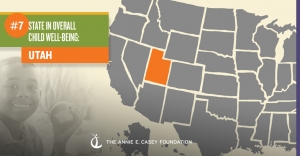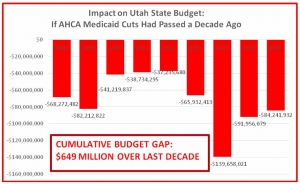Kids Count Data Center
State Policy
What do Utahns Think About the Proposed Changes to Medicaid and PCN? Results of a Statewide Survey
Congress Missed the Deadline on CHIP: What Does That Mean for Utah Kids? (And what we can do about it)
Tell Congress to Protect Healthcare for Kids: Graham-Cassidy ACA Repeal Bill Threatens the Children’s Health Insurance Program
2017 Measures of Child Well-Being in Utah and the National Annie E. Casey Data Book Released
Voices for Utah Children recently released our annual data book Measures of Child Well-Being in Utah along with the National Annie E. Casey Data Book. These annual publications provide citizens, advocates, community leaders and policymakers with the most timely and comprehensive data regarding the health and well-being of Utah's children. Combined, these publications provide a look at how Utah compares to the rest of the nation, as well as a more in-depth picture of child well-being at the county level. Used together, these data books are a reliable source for accurate information that can help shape priorities and policies to improve the well-being of Utah's children.
If we had a crystal ball that told us how our children would be doing two, five, or ten years down the road we could make thoughtful, calculated policy decisions. To make plans for an increasing number of children it is imperative that we have good data on how children have fared in the past and how that compares to today. That is one of the basic premises of the KIDS COUNT Project - provide accurate, accessible data to make sure the future that is “just around the corner” is a positive one for all of Utah’s children.
One of the things we know about children in Utah is that there will be more of them in the future. Population estimates from the U. S. Census Bureau indicate that the number of children in Utah in 2011 was 882,354. By 2015 that number had risen to 912,496. By 2050, the Utah Governor’s Office of Planning and Budget projects that Utah’s child population will be well over a million at 1,388,651. With an expanding child population, it is important to understand what the needs are today so we can plan for tomorrow. So how are the children doing?
According to the National Data book, improvements have been achieved across almost all key areas of well-being for children. The state is ranked seventh nationally in overall child well-being, landing in the top ten for both child economic well-being and family and community context. This data points to the fact that children in Utah are benefiting from state policies aimed at helping them succeed.
Boosted by the Children’s Health Insurance Program (CHIP), Medicaid and a push for outreach, Utah has dramatically increased access to health insurance for children: Between 2014 and 2015, 20,000 fewer children lacked coverage. This progress has helped Utah recover from a fall to 27th place in child health last year, and the state now ranks 19th nationally. However, at 7%, the percentage of children without insurance is still above the national average and more can be done to provide kids with the health and security proven to better position them for success later in life.
The annual KIDS COUNT Data Book uses 16 indicators to rank each state across four domains — health, education, economic well-being and family and community — that represent what children need most to thrive. Utah ranks:
- 5th in economic well-being. At 20 percent, Utah has one of the nation’s lowest percentages of children who have no parent with full-time, year-round employment. However, the percentage of children living in poverty remained unchanged at 13 percent between 2014 and 2015.
- 15th in education. The state saw decreases in the percentage of eighth graders scoring below proficient in math, fourth graders who were below proficient in reading, and in the number of 3- and 4-year-olds not attending school.
- 3rd in the family and community domain. Just 5 percent of children in Utah live in high-poverty areas, which is well below the national average of 14 percent. The teen birth rate has fallen to 18 births per 1,000 females.
- 19th in health. The percentage of teens abusing drugs and alcohol remained at 5 percent for the third consecutive year. The child and teen death rate also hovers at the national average of 25 deaths per 100,000 children.
Along with critical gains in health, the 2017 Data Book shows that investments in early childhood education are paying off. Utah exceeds the national average for its percentages of fourth graders meeting proficiency in reading, eight graders meeting proficiency in math and high schoolers graduating on time. Utah also saw a decrease in the percentage of children ages 3 and 4 who are not in school, a trend that is likely to continue as positive policies such as SB 101 — which makes it possible to offer scholarships for quality preschool to families living in intergenerational poverty — are implemented. Positive policies such as this will have profound impacts on children’s lives.
Supplementing the National Data Book is Measures of Child Well-Being in Utah, an annual publication from Voices for Utah Children that presents county-level data to local policymakers and planners. Measures of Child Well-Being in Utah also provides information at the state-level on racial and ethnic disparities and it highlights emerging trends. In Utah, child death rates, suicide rates, and chlamydia rates are all on the rise. While the percentage of uninsured kids has been improving, this indicator will be affected by future policy decisions around Medicaid and CHIP.
Measures show that the percent of kids in poverty in Utah has declined slightly but there are differences depending on where you live and if you are a child of color. Statewide, almost 13% of kids live in poverty, around 116,000 children. However, 25% of Latino/a children live below the poverty level and county poverty levels range from a low in Morgan of 5.3% and a high of 31.9% in San Juan County.
Education data in Measures indicates that, once again, more children are enrolled in our schools than the year before. From Fall of 2015 to Fall of 2016 enrollment increased by 11,680 students. And this yearly increase is a common occurrence.
The Utah KIDS COUNT Project is funded by the Annie E. Casey Foundation whose primary mission is to foster public policies, human-service reforms, and community supports that more effectively meet the needs of today’s vulnerable children and families. By providing policymakers and citizens with benchmarks of child well-being, KIDS COUNT seeks to enrich local, state, and national discussions of ways to secure better futures for all children. It is intended to gauge the seriousness of the problems facing children, and to guide the policy trends and goals on behalf of children. Using these two publications together, KIDS COUNT can measure child outcomes and contribute to public accountability for those outcomes.
For 30 years now, Voices for Utah Children has called on our state, federal and local leaders to put children’s needs first. But the work is not done. The children of 30 years ago now have children of their own. Too many of these children are growing up in poverty, without access to healthcare or quality educational opportunities.
How can you be involved?
Make a tax-deductible donation to Voices for Utah Children—or join our Network with a monthly donation of $20 or more. Network membership includes complimentary admission to Network events with food, socializing, and opportunity to meet child advocacy experts. And don't forget to join our listserv to stay informed!
We look forward to the future of Voices for Utah Children and we hope you will be a part of our next 30 years.
Special thanks to American Express, our "Making a Difference All Year Long" sponsor. 
The Wild Bunch: Kids’ Health Legislation in the 2017 Session
First there was the “The Good, the Bad and the Ugly” recap of the 2015 Legislative Session. In 2016, we brought you “The Magnificent Seven.” In keeping with the Western movie-themed recap of kids’ health bills, for 2017 we bring you:
“The Wild Bunch”,
a nod to Sam Peckinpah’s classic:a gritty gang of bills that made it through, and others that were lost in the fight…
Improving access to health coverage and care:
Several bills and appropriation requests were introduced that would expand children’s access to care or coverage including…
Wins for kids’ oral health care access! Senator Christensen (R-Ogden) sponsored SB 51, which would return Medicaid managed care services to a fee for service model. Ultimately, this bill was decided outside of legislation, however, the agreement reached will help more children access a Medicaid pediatric dentist or school-based preventive dental care. To further monitor the issue, Senator Escamilla (D-Salt Lake City) sponsored intent language that directs the Department of Health to investigate pediatric dental care access issues kids enrolled in Medicaid may experience (SB 2).
In addition, the Department of Health announced this Legislative Session that they will be moving forward on expanding parents’ access to Medicaid, starting in the new fiscal year (July 2017). Initially included in last year’s bill, HB 437 (Representative Dunnigan, R-Taylorsville), parents below 60% FPL can now access Medicaid coverage (SB 7). Unfortunately, other coverage priority issues, including 12-month continuous eligibility for children on Medicaid, did not receive a funding appropriation this session. Thank you, Representative Ward for championing this important issue!
Greater focus on early childhood and maternal health:
This session, we saw several bills that expand new mothers’ access to care, while also strengthening early childhood services and care. Representative Redd sponsored HB 122 which would expand new moms’ access to Medicaid mental health services. Unfortunately, this bill did not advance, but we look forward to robust conversation about maternal health during Interim!
Medicaid funding for expanding family planning Services (HB 57, Representative King, D- Salt Lake City) was another budget item that did not receive funding, despite broad support from the Governor, Representative King, and other legislators. This appropriation would have helped individuals in the coverage gap access family planning services, and be more emotionally and financially-prepared for a newborn. Family planning services can also help women avoid risky pregnancies or other health complications. We will be supporting this important funding item again in the future.
We will also continue to support Family Medical Leave. Representative Pitcher (R-Ogden) sponsored HB 242, which would expand the number of small businesses required to offer unpaid leave to their employees, ensuring that more families could take advantage of the Family Medical Leave Act.
But there were other wins for new moms and babies including much-needed funding support for Early Intervention Services/Baby Watch (Senator Luz Escamilla, D- Salt Lake City, SB 2) and SB 135 which will strengthen statewide, evidence-based home visiting programs for low-income mothers by conducting a study and creating a restricted account (Senator Escamilla).
In addition, Senator Ann Millner sponsored SB 100, which directs the Department of Workforce Services to assess and strengthen early childhood services and supports. Both SB 100 and SB 135 will improve services for new moms and babies in the future.
Protecting Families from Burdensome Medical Expenses:
Several of the bills we supported would enhance consumer and family protection. Representative Dunnigan (R-Taylorsville) was a dedicated champion of HB 395 that would help consumers avoid surprise medical bills in an emergency room setting. This bill also included other important protections for consumers to assure that they can access adequate provider networks, without having to travel too far or wait too long to see a provider. It would also strengthen health insurance provider directories to make sure that consumers have access to accurate and up-to-date provider information. While this bill ultimately did not move forward, it sparked greater awareness and conversation about the issue of surprise medical bill that will continue into the interim.
A win for families is HB 278 (Representative Chavez-Houck, D- Salt Lake City), which makes it easier for divorced parents to seek medical care for their children. It requires medical providers to separately bill each parent for their due portion, and prohibits a parent from getting a negative credit report if the other parent has not made his or her portion. The onus is no longer on the parent to track down the full payment or risk a bad credit score. HB 278 will help more kids get the care they need.
Strengthening school-based health care and student mental health:
Finally, we also tracked several bills related to student health and well-being. A big win this session for Utah kids is the repeal of the so-called “No Promo Homo” in SB 196. Previously schools were not allowed to discuss homosexuality in the classroom and curricula. This harmful and discriminatory policy was repealed thanks to the efforts of Senator Stuart Adams (R-Layton), champions at Equality Utah and others, creating a more inclusive environment for Utah kids.
Another win for Utah students was Representative Thurston’s (R- Provo) bill HB 308 which will strengthen protections for Utah students against disease outbreaks, and standardize vaccination exemption requirements and procedures, creating an online education module for those seeking an exemption.
Overall, lawmakers took several key steps toward addressing bullying, student safety and teen suicide in Utah. Senator Escamilla (D-Salt Lake City) sponsored SB 161, which passed in the eleventh hour. SB 161 strengthens school anti-bullying policies, and gives parents and school staff greater ability to address anti-bullying behavior. Representative Eliason (R-Sandy), who was also the floor sponsor for SB 161, sponsored HB 223 which establishes a suicide prevention education program, including firearm safety curriculum to be made available in schools. HB 223 is another important step toward addressing Utah’s youth suicide crisis.
But of course, a few good bills did not make it through despite a strong fight…
Representative King (D- Salt Lake City)’s bill HB 215, supported comprehensive sex education curriculum for Utah students. The bill hearing generated broad public debate; committee members agreed that the conversation around comprehensive sex education should continue next session.
Representative Eliason’s bill, HB 390 would have expanded mental health counselors in Utah schools by creating a pilot program. Although not funded, the bill highlights the need for increasing school counselors in Utah schools.
Despite a wild session, there were a bunch of important wins for Utah children, including expanding parents coverage and access to oral health care, strengthening early childhood health and a greater awareness of maternal health. As for the defeated bills and the battles lost, the fight continues.
Thanks to all who worked on these, and many other, important bills that will make a difference in the health of children and families in the Beehive State.
 March 30, 2017 is Love UT Give UT!
March 30, 2017 is Love UT Give UT!
It’s a day for Utahns to give to the nonprofits that make Utah special. Every donation to Voices for Utah Children through Love UT Give UT gives Voices a chance to win matching grants and prizes—and gives you a chance to win a car!
And you don't have to wait! Donate now at http://bit.ly/loveUTchildren.
For 30 years now, Voices for Utah Children has called on our state, federal and local leaders to put children’s needs first. But the work is not done. The children of 30 years ago now have children of their own. Too many of these children are growing up in poverty, without access to healthcare or quality educational opportunities.
How can you be involved?
Make a tax-deductible donation to Voices for Utah Children—or join our Network with a monthly donation of $20 or more. Network membership includes complimentary admission to Network events with food, socializing, and opportunity to meet child advocacy experts. And don't forget to join our listserv to stay informed!
We look forward to the future of Voices for Utah Children and we hope you will be a part of our next 30 years.
Special thanks to American Express for sponsoring our 30th Anniversary Year. 
Under Congressional Health Care Plan, Utah Stands to Lose Millions, New Estimates Show
Salt Lake City—A new analysis shows the impact that the Republican health plan bill, the American Health Care Act (AHCA), would have on Utah’s state budget. The report finds that the health plan’s proposed restructuring to the Medicaid program would lead to drastic cuts in federal funding.
The analysis, released today by Voices for Utah Children, examines retrospective data and the impact of the proposed Medicaid changes, had they gone into effect a decade earlier. The estimates find that Utah would have experienced a budget gap of $649 million over the last ten years. The report concludes that given inflation and rising health care costs, Utah can expect the budget gap for the coming years to significantly exceed what it would have been in the past.
As part of the AHCA, federal funding for the Medicaid program would be capped and states would receive a per capita allotment. States would get less federal funding than under current law and would expect to see cuts increase over time. To make up for the decline in federal dollars, Utah may need to cut benefits to Medicaid enrollees. Under the per capita cap scenario, states would not have funding for unexpected health care cost growth from disease outbreaks or new life-saving drugs.
“The GOP health plan shifts costs to states and forces our state lawmakers to choose which health care services vulnerable kids will—and will not—receive,” said Jessie Mandle, Senior Health Policy Analyst with Voices for Utah Children. “These are decisions health care providers should be making, not politicians.”
The AHCA changes Medicaid’s current financing structure. The state budget shortfalls that would result would lead to limits placed on the Medicaid program, such as a reduction in benefits, lower provider payments or fewer children covered. The report suggests that the proposed restructuring of the Medicaid program puts Utah children’s health care and coverage at risk.
Read the full analysis here:
Under the ACA Repeal Bill, Utah Medicaid Stands to Lose Millions over a 10-Year Period
###
 March 30, 2017 is Love UT Give UT!
March 30, 2017 is Love UT Give UT!
It’s a day for Utahns to give to the nonprofits that make Utah special. Every donation to Voices for Utah Children through Love UT Give UT gives Voices a chance to win matching grants and prizes—and gives you a chance to win a car!
And you don't have to wait! Donate now at http://bit.ly/loveUTchildren.
For 30 years now, Voices for Utah Children has called on our state, federal and local leaders to put children’s needs first. But the work is not done. The children of 30 years ago now have children of their own. Too many of these children are growing up in poverty, without access to healthcare or quality educational opportunities.
How can you be involved?
Make a tax-deductible donation to Voices for Utah Children—or join our Network with a monthly donation of $20 or more. Network membership includes complimentary admission to Network events with food, socializing, and opportunity to meet child advocacy experts. And don't forget to join our listserv to stay informed!
We look forward to the future of Voices for Utah Children and we hope you will be a part of our next 30 years.
Special thanks to American Express for sponsoring our 30th Anniversary Year. 








